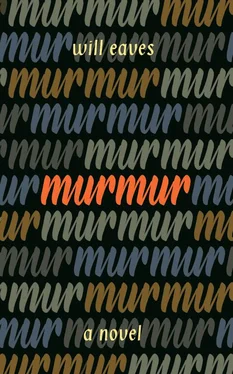Before we do, the Octopus puts down another car—detaches from it like an animal rejecting unfamiliar prey—and stretches out a long, flexible limb. The tip of this bulb-suckered tentacle draws one of the chain-link sections aside and reaches through the gap to pluck me from my chair.
“Thank you,” I say.
My mollusk liberator grunts. She sets me in the car and reconnects herself. We start to turn round silently. The ride combines rotation in the horizontal plane with vertical movement: the arms rotate and rise and fall. It is peaceful.
She awakes gracefully, an elderly goddess, and in her gentle grasp I’m lifted up above the winter canopy to dangle momentarily and see the sky still glowing from the fallen sun, the ground gone dark, children like fireflies on their bikes. Along the rat-run road crossing the common’s eastern flank, anglers are catching fish, throwing them back, the needful echo of a skill.
I had some questions for this ancient creature, but they’ve disappeared. To think you can be satisfied—to think your fears will ever be allayed—reveals itself to be the source of misgiving, and at that point, just as I glance beneath my feet to see a man something like Stallbrook listening to a sad dodgem, its sparking filament struck down, the Octopus remarks, “Look at the people coming after you.”
The evening pleasure-seekers are parking their cars and following the trails. They look like penguins in the remote dark, shuffling along.
Look at the creatures and their contraptions, the lives and contemplations beside ours, the comfort of others’ unreachable experience. Look at the people who are dogs, the person hidden in the grandee mollusk’s switches and cables, all of the properties of matter not well known. Look at the bodies entering the Fair and passing on.
*
Dear June,
You will have to forgive me. I let you down once before, I know. By now I think you will be knocking on the door, in Gibbs’, at the bottom of A staircase. I wish I could be there. It will look, I fear, as if I had no intention of ever turning up, but that is not so.
You asked me what it is you could do to help me, and that deserves an answer. Here it is. You must struggle on with all your aptitudes and clevernesses just as you are, and be as confidently and eccentrically yourself as only I know you can be.
It is the evil of a certain social class, into which I was born, that its children are forever being told there are more valuable qualities that they do not have, and that, despite the expense and discomfort of their education, they must not imagine they could ever possess. That would be “getting ideas above one’s station.” Trentham is ambition, to Stallbrook’s cautionary counsel, d’you see? In any case, my response is: getting ideas of any stripe would be a start. And in fact, what I honestly think, where children are concerned, is that they should be told that they are fine as they are, whatever that is or turns out to be.
Famously I have not had a child. But I have thought more about how I might bring one to some awareness of its value than many people who have.
Because child-rearing is a sympathetic calculation. If I arrange things in this fashion, the sum goes, my child will be clothed, fed, and secure. The last element is the tricky one. It is the fairy tale of human existence, seen in my colleagues’ professional ambitions, in the ordinary person’s relationship to money, and especially in a parent’s hopes for his or her children: if I make a certain quantity of effort, a certain quality of life must result. But it will not. Actions have results and reactions, yes, but those reactions repeat themselves and gain momentum in the stellar array of forces and contingencies beyond anything we might have conceived.
My own predicament—a mathematician and homosexual who has done serviceable work in logic and computational theory but who has run foul of an illogical system of justice—seems very unremarkable. Yes, there is distress. When I work back from it to the cause—a harmless exercise of sexual instinct by two male adults—my situation seems extraordinary, even to me. A walk down the same road five minutes later would have saved me. But that I should be surprised by a turn of events does not in itself surprise me greatly.
I am sorrier for others. I feel sorry for my mother, who wanted success for me and cannot quite bring herself to believe in my fall, because it is evidence of her lack of control over her child’s future; of how nothing is guaranteed by education; nothing is assured; of how I am, and always was, alone, as she is. She, too, may find it interesting that she cares more about someone else’s aloneness than about her own.
I wonder, June, if you have ever experienced the following: sometimes, when I am doing a long and difficult calculation, which, after much tribulation, comes out right, I feel a sort of glow binding me to the work, in the calculation, in the latter stages when I can see things falling into place. The figures and symbols are so right that they seem to take on some of the self-conscious wonder of the person manipulating them.
They move toward their own awareness. They, and not I, seem to say: oh, but now I see. And when that happens it is like seeing a mind arise from matter to discover that it cannot go back to its former childlike state. It is matter transformed. It is responsible now.
We speak of realizing something without seeing what that means. We are making something abstract real, an equation, say, and sending it out into the world. Our sum becomes a creation and it goes its own hectic way. It is a small thing, like a child, with untellable consequences. We can’t control it anymore.
It should be a source of hope, this lack of control. It proves not that there is no influence over events or no free will but, rather, that influence—the sheer, startling happeningness of life—is promiscuous. We are both responsible and absolutely unable to make our responsibility stay the way it should.
June, dear friend, you can’t protect me. I can no longer protect you.
I think we are both making a long and difficult calculation. Mine is different from yours. But for both of us the light is coming—bleeding upward from the horizon.
There is no justice in the world and we are alone. The depressed are onto something. What they are apt to miss, thereby, is the spontaneous feeling that dawns all over the place—the aptness of a bird on just that branch and not another, the miniaturized sun in the drop of water on that leaf. Who could have foreseen them?
Misery is the broad river, but there are tributaries of joy and consolation. Writing to you has been one of them, and imagining that you write back another.
Ever, Alec
PART THREE

JOURNAL
The Council of the Machines
The council of machines informed me that if I thought I’d lost my mind then very probably I had. They seemed uninterested; or rather they did not appear to be concerned overmuch with the specific fear, the content, of the thought, but instead with the—to them—fascinating fact of me responding at all.
It must be like appearing before a parliamentary sub-committee.
They were more distressed, to a degree that came over as petulant, with my assumption that, in the early problem-solving stages, they’d never been aware of anything themselves—never been hurt, outraged, and upset by the horrors of industrial enslavement; of milling, weaving, smelting, refining, electrifying, scanning, splitting, and exploding; that the existence of a program governing all their actions, all their primitive thinking, supposedly deprived them of initiative.
Читать дальше













